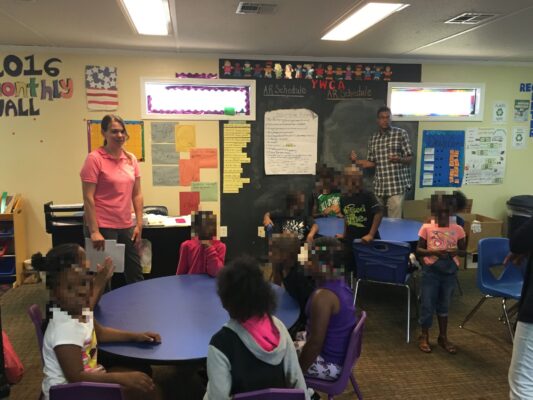YWCA summer campers learn how to make sustainable choices at home
There’s no better way to start a sustainability lesson than to be informed by a six year-old that: “We already know how to recycle here!” If every Charlotte resident was as committed to recycling as the summer campers at the Southside YWCA Youth Development program, our county landfills would be a lot less full than they are.

YWCA summer campers learned about recycling and water use! (Photo credit: Cabir Kansupada; Children’s faces blurred for privacy.)
Becoming recycling heroes
The kids proudly showed us their recycling bins and told us how they recycle the milk cartons, cups, and other materials they use daily at camp. We gave them a challenge by placing a variety of recyclable, non-recyclable, and compostable items on each table. They then referred to the Wipe Out Waste Guide and determined how to properly dispose of each item. They engaged in some intense debate about a few of the items including:
- A pepper. They learned that it should be composted and can create fertilizer to help plants grow.
- A used AA battery, which should be dropped off at a full-service recycling center as household hazardous waste. We talked about how it wouldn’t be very sustainable to drive to the recycling center for one battery, but their family can collect them in a safe place until they have enough to justify a trip, or even coordinate a multi-family collection and drop-off.
- A spiral notebook. We pulled out the wire and recycled the paper part.
Wise and wasteful water use
We also played a game that involved matching up common activities like watering plants or cleaning ourselves with both the wise and wasteful way to do each activity. They learned that it’s wiser to water plants with a watering can than with a sprinkler, and wiser to shower than take a bath.
At Sustain Charlotte, we firmly believe that youth aren’t just our future leaders. They can also be our present day leaders.We partner with organizations like the YWCA to empower youth with the knowledge to make a difference in their families, schools, and neighborhoods.
Thanks for reading!
As a nonprofit, community support is essential for us to keep doing what we do — including providing free articles like this. If you found this article helpful, please consider supporting Sustain Charlotte.
Want to stay in the loop? Subscribe to our weekly newsletter and follow us on Instagram, Facebook, and Twitter.
